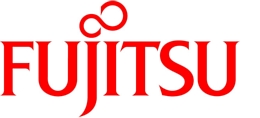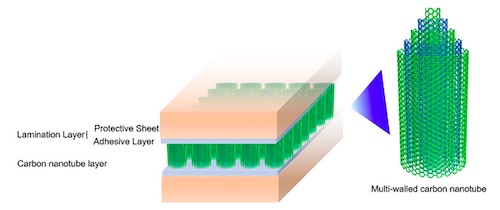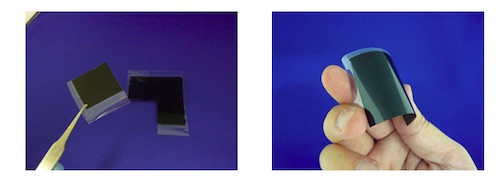|
| Friday, 17 April 2020, 09:31 HKT/SGT | |
| |  | |
Source: Fujitsu Ltd | |
|
|
|
KAWASAKI, Japan, Apr 17, 2020 - (JCN Newswire) - Fujitsu Laboratories Ltd. today announced the development of the world's first adhesive sheet composed of carbon nanotubes with extremely high thermal conductivity of up to 100 W/mK (watt per meter per Kelvin)(1).
 | | Figure1: Internal structure of carbon nanotube adhesive sheet |
 | | Figure 2: Carbon nanotube adhesive sheet |
Carbon nanotubes have high thermal conductivity and represent a promising candidate for heat dissipation from heat sources including semiconductor devices. Nevertheless, the material remains difficult to handle due to its fragility, rendering it impractical for many purposes. To address this, Fujitsu developed a technology for laminating vertically aligned carbon nanotubes, while maintaining their original characteristics of high thermal conductivity and flexibility, as well as a technology for bonding them with sufficient adhesion. This technology facilitates the cutting and handling of carbon nanotube sheets, making it possible to use them as a heat dissipation material, for example, in automotive power modules for electric vehicles (EVs).
Fujitsu aims to license the use of its newly-developed carbon nanotube adhesive sheets to companies in the materials and electrical industries, and will continue to support their use in a variety of commercial applications.
Background and Development
EVs are increasingly being put to practical use as efforts to regulate greenhouse gases accelerate throughout the world. Despite this, the fact that EVs are more expensive than gasoline-powered vehicles and lack similar driving ranges continues to hinder their widespread adoption. In order to improve the cost-performance and driving range in recent years, efforts have been made to develop semiconductor devices that use silicon carbide or gallium nitride as an alternative material to the more commonly-used silicon to reduce the size, weight, power consumption, and cost of power modules for electric vehicles. In order to make this a reality, however, countermeasures to deal with heat generated around semiconductor devices due to module miniaturization must be resolved, and components such as heat dissipation materials and bonding materials that make up modules must be designed to achieve unprecedented levels of heat resistance and thermal conductivity.
Challenges
Carbon nanotubes, a type of nanotechnology material made from carbon atoms, have thermal conductivity that is about 10 times higher than copper. One potential use of this material is its use as a heat sink for dissipating heat from heat sources like semiconductor devices. In 2017, Fujitsu developed a high thermal conductivity sheet using carbon nanotubes, but in order to maintain the sheet shape, the sheet is sintered and molded at an ultra-high temperature of 2000 degrees Celcius or higher, which results in a material that is inflexible. A hard sheet can be attached to flat materials, but it is not suitable for joining materials together that are uneven, which inhibits the places in which the sheet can be applied. Furthermore, in areas around semiconductor devices where reliability is essential, it is necessary to bond both the semiconductor and heatsink via a heat dissipation sheet consisting of carbon nanotubes in order to follow the change in shape caused by temperature differences before and after the device is operated. In general, carbon nanotubes are made adhesive by mixing them into an adhesive material such as resin or rubber, forming a sheet. However, because these adhesive materials have low thermal conductivity, it has been extremely difficult to achieve sufficient levels of both thermal conductivity and adhesion.
About the Newly Developed Technology
Fujitsu has developed the world's first carbon nanotube adhesive sheet that exhibits extremely high thermal conductivity of up to 100 W/mK even when interface resistance is included. The features of the developed technology are as follows.
Sheet Laminate Technology Fujitsu has developed a technique for laminating vertically aligned carbon nanotubes while maintaining the alignment. The laminate layer consists of two layers, a protective sheet and an adhesive layer, and has a laminate structure in which the laminate layer protects the top and bottom of carbon nanotubes. Carbon nanotubes are difficult to use as heat dissipating materials because they easily lose their shape. However, this technology protects the carbon nanotubes themselves with a laminate layer, making them stable in shape and making cutting and handling easier, which was difficult with conventional technologies.
High-Thermal-Conductivity Sheet Bonding Technology The adhesive layer that makes up the laminate layer is made of a polymer that is several microns thick. Because even a small amount of resin can cause large thermal resistance, it has become an issue that must be solved to achieve both adhesiveness and thermal conductivity. Thus, by optimizing three or more correlation parameters, such as the density of carbon nanotubes, the type and thickness of the resin, and the bonding conditions, utilizing knowledge of thermal resistance at the interface between carbon nanotubes and resins cultivated over many years, it becomes possible to bond carbon nanotubes while maintaining sufficient adhesive properties without impairing thermal conductivity.
Effects
The newly developed carbon nanotube adhesive sheet has thermal conductivity of up to 3 times that of the conventional indium heat dissipation material, which is known as a high thermal conductivity material, compared with measured values including interface resistance. Since the sheet is laminated with adhesive and protective layers, it can be easily cut and handled, and can be used for applications requiring adhesion (Figure 2). These technologies will make it possible to put carbon nanotubes into practical use as heat dissipating materials, including in automotive power modules for EVs.
Future Plans
Going forward, Fujitsu Laboratories will license the use of its carbon nanotube adhesive sheets to companies in the materials and electrical industries. and will continue to support their commercialization and practical use.
(1) W/mK (watt per meter per Kelvin) Unit for measuring thermal conductivity.
About Fujitsu
Fujitsu is the leading Japanese information and communication technology (ICT) company, offering a full range of technology products, solutions, and services. Approximately 132,000 Fujitsu people support customers in more than 100 countries. We use our experience and the power of ICT to shape the future of society with our customers. Fujitsu Limited (Code: 6702) reported consolidated revenues of 4.0 trillion yen (US $36 billion) for the fiscal year ended March 31, 2019. For more information, please see www.fujitsu.com.
About Fujitsu Laboratories
Founded in 1968 as a wholly owned subsidiary of Fujitsu Limited, Fujitsu Laboratories Ltd. is one of the premier research centers in the world. With a global network of laboratories in Japan, China, the United States and Europe, the organization conducts a wide range of basic and applied research in the areas of Next-generation Services, Computer Servers, Networks, Electronic Devices and Advanced Materials. For more information, please see: http://www.fujitsu.com/jp/group/labs/en/.
Fujitsu Laboratories Ltd.
Devices & Materials Research Center
E-mail: nanocarbon@ml.labs.fujitsu.com
Topic: Press release summary
Source: Fujitsu Ltd
Sectors: Electronics
http://www.acnnewswire.com
From the Asia Corporate News Network
Copyright © 2026 ACN Newswire. All rights reserved. A division of Asia Corporate News Network.
|
|
|

|
|
|
|
| Fujitsu Ltd |
| Mar 3, 2026 20:00 HKT/SGT |
|
Fujitsu and BCN Port Innovation Foundation leverage ocean digital twin technology to drive the regeneration of the Port of Barcelona |
| Mar 2, 2026 10:55 HKT/SGT |
|
Fujitsu supports sustainable growth for retailers with data and AI through Uvance for Retail |
| Feb 27, 2026 11:03 HKT/SGT |
|
Fujitsu POS solution enhances customer experience at Hankyu Hanshin Department Stores |
| Feb 25, 2026 11:00 HKT/SGT |
|
Beisia Automates Supermarket Refrigerator Temperature Monitoring and Recording with Fujitsu's IoT Visualization Solution |
| Feb 24, 2026 10:23 HKT/SGT |
|
Fujitsu expands Uvance for Finance offerings to accelerate DX across financial sector |
| Feb 19, 2026 11:12 HKT/SGT |
|
Osaka Hospital launches project to safely utilize generative AI for healthcare workforce improvements |
| Feb 18, 2026 09:41 HKT/SGT |
|
Fujitsu named to FORTUNE Magazine's list of 'World's Most Admired Companie's for eighth year running |
| Feb 17, 2026 11:21 HKT/SGT |
|
Fujitsu automates entire software development lifecycle with new AI-Driven Software Development Platform |
| Feb 13, 2026 21:50 HKT/SGT |
|
Fujitsu and 1Finity to highlight latest network technologies and AI solutions at MWC Barcelona 2026 |
| Feb 13, 2026 21:33 HKT/SGT |
|
Fujitsu to present latest technologies for creating social and industrial value through fusion of AI and computing at India AI Impact Summit 2026 |
| More news >> |
 |
|
 |
|